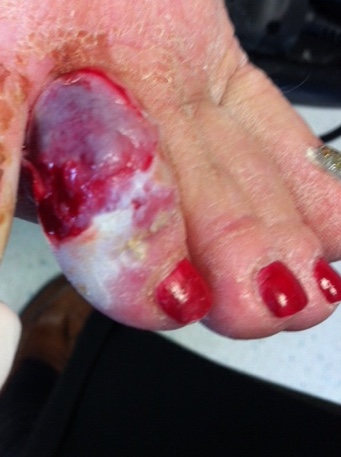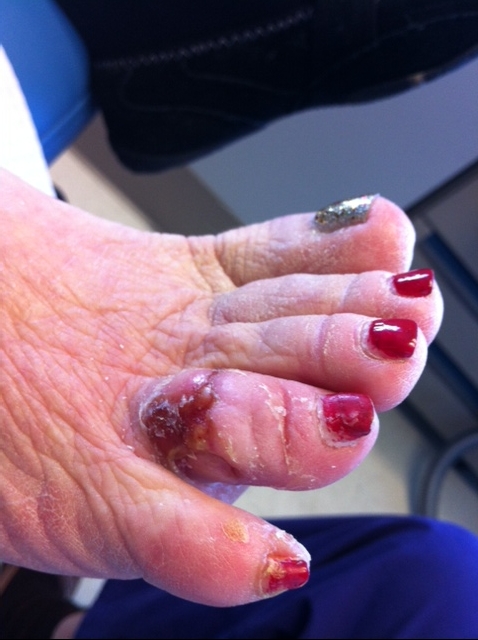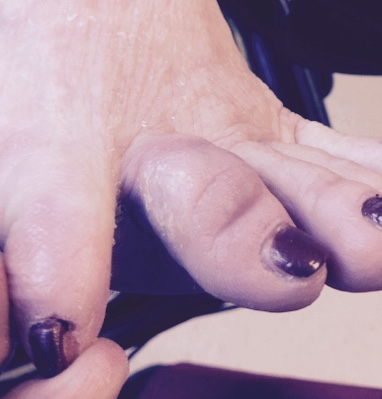Our Temple Hills & Clinton, MD Podiatrist specializes in Diabetic Foot Care & Wound Care
DIABETIC FOOT CARE
Diabetes has become an epidemic in this country. If you have diabetes it is essential that you have your feet evaluated by a podiatrist. Our Podiatry Team, Dr. Burton Katzen, DPM, LLC, is here to help. Diabetes is a chronic metabolic disease that affects over 16 million people in this country. Individuals with diabetes are prone to many complications, the most common one being foot problems, including infections, which if left untreated, could lead to potentially serious consequences, including amputation. A diabetic may also develop kidney, eye, heart, teeth, and circulation problems along with nerve damage. Fortunately, a diabetic who is under control and lives a healthy life style has a far less chance of developing any of these complications.
With diabetes, you also have a good chance of developing peripheral neuropathy. Symptoms of peripheral neuropathy can be pain, numbness, tingling and burning sensation in your feet. We recommend that you come in for a comprehensive diabetic foot evaluation. We will use the latest technology to test and assess the circulation to your feet, and determine if you have peripheral neuropathy. Once the evaluation is complete, We will design a treatment plan specifically for you.
THE RELATIONSHIP BETWEEN DIABETES AND FOOT PROBLEMS:
Many people with diabetes have mild to severe forms of decreased circulation and nerve damage (peripheral neuropathy). These two conditions can combine to form a lethal combination because simple cuts, scratches, and breaks in the skin can occur without you feeling them and invite infection because of the lack of circulation to bring infection-fighting cells to those tissues that need them.
Many common pressure producing foot problems such as blisters, corns, calluses, warts, fissures, athlete’s foot, ingrown nails and incorrect nail trimming can become limb and even life threatening if left untreated in a diabetic.
THE WARNING SIGNS OF FOOT PROBLEMS:
Burning, tingling, or painful feet.
Loss of sensation in the feet
Change in shape of the feet
Hair loss on toes
Dry and cracked feet
Toe fungus or infections
Blisters, sores, ulcers, ingrown toenails, or infected corns that are slow to heal
Changes in the color or temperature of the skin on your feet
Pain or swelling of the foot or ankle
Pressure points such as corns, calluses or bunions
If you're a diabetic, schedule an appointment with our Podiatrist so that Dr. Burton J. Katzen, DPM, LLC can provide you with the care you'll need to minimize possible complications.
Diabetic Shoe Program - Prescription Shoes
DIABETIC SHOES AT MINIMAL COST TO YOU!
Many diabetic patients experience problems with their feet due to poor circulation and loss of sensation. Caring for your feet when you have diabetes is very important for avoiding serious complications. If you are a diabetic with Medicare/Medicaid secondary insurance, you can receive at minimal cost to you a pair of comfortable supportive shoes designed to prevent blisters, corns, calluses, ulcers and other kinds of sores that occur with the diabetic foot.
You are entitled to one pair of shoes and three pairs of customized inserts every year. This is a program initiated by Medicare to help prevent diabetic complications that may be limb threatening before they occur. There are a wide variety of style and color choices.
We will do all the paperwork and fittings, and your satisfaction is guaranteed. Contact our Podiatry Practice for more information.
WOUND CARE | FOOT ULCERS
Having an open wound, increases the chances of infection. If you have a non healing wound on your lower extremity, it is essential that you act to get it healed as quickly as possible to prevent infection and further complications. If you have diabetes, you are especially at risk for complications. The sooner a wound is treated the greater the patient's chances are of healing.
There are three different types that are differentiated by their locations on the body and their appearances. Venous stasis ulcers are found below the knee and usually on the inner leg. They are irregularly shaped, swollen, warm, and often discolored. Neurotrophic (diabetic) ulcers are typically, but not exclusively, found at pressure points on the foot. They vary in size and are pink/red or brown/black in color. Arterial (ischemic) ulcers are also found on the foot, usually on the heels or tips of the toes. They can be yellow, brown, black, or grey in color and do not bleed.
When you first come to our practice, Dr. Burton Katzen, DPM, LLC, we will use the latest technology to perform a comprehensive neurologic, vascular and orthopedic exam. Once the wounds are healed, patients are regularly followed up to help avoid future problems.
Saving Limbs
So, if you have a non-healing wound on your foot, ankle or leg especially if you're diabetic, we strongly recommend that you schedule an appointment for a comprehensive evaluation. We know how painful and dangerous ulcers can be. To learn more about the various treatments and how to reduce one’s risk of developing foot ulcers in the first place, please contact Dr. Burton J. Katzen, DPM, LLC today.





